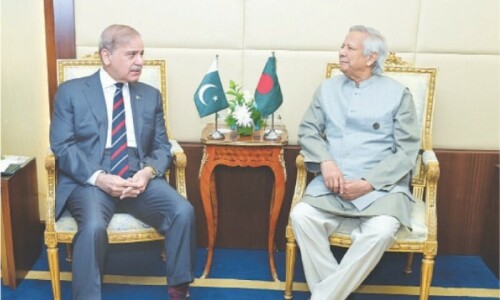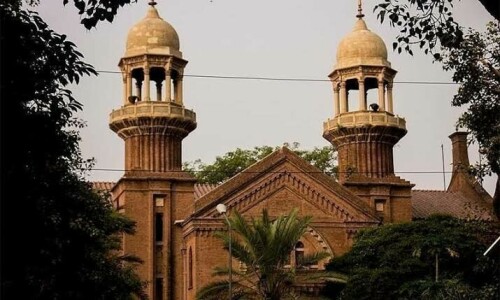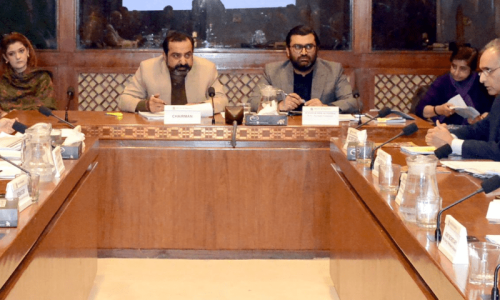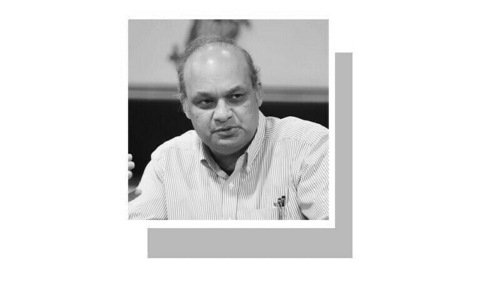KARACHI, Feb 9: State Bank Governor Dr Shamshad Akhtar lost her cool on Saturday afternoon at a meeting with businessmen when the monetary tightening policy came under sharp criticism.
“I cannot take these allegations,” she replied angrily when one of the businessmen implied in his observations that the monetary policy had hurt the industry but had pleased banks.
In more than two hours of heated and, at times, vitriolic discussions, at the Federation of Pakistan Chambers of Commerce and Industry, Dr Shamshad held that the Rs 335 billion borrowing by the government over the past six months had been instrumental in creating big liquidity in the market, generating demand pressures.
“This situation forced the State Bank to take steps to curb demand pressures and contain inflation,” Dr Shamshad said.
“Core inflation is down to 5.7 per cent, well below the targeted six per cent for the current fiscal year,” she said, pointing out that food and energy inflation was caused by supply side factors.
“Imagine where would have been inflation if the SBP had not maintained a strict tight monetary stance,” she retorted, indicating that it would have been in double digits.
Core inflation, she explained in another context, was over 50 per cent of the CPI.
She said that government was forced to borrow heavily this year, perhaps which was unprecedented, because of the rising international oil prices and growing pressures of subsidy. As government borrows from the central bank, it impacts on market liquidity. But she hoped that the government would start retiring its debts from April next when the inflows from foreign sources starts picking up and alternative saving instruments are introduced.
“But the impact of monetary overhang will not be removed from retiring of the borrowed money by the government as it has already been spent on oil import and subsidy,” interrupted the president of the Federation, Mr Tanvir Ahmad Sheikh. “Had the government invested borrowed money in some productive avenue, there might have been some reason to hope for inflow of incomes,” he said. His observation went unnoticed by the governor. But the breaking-point came when Engineer M. A. Jabbar pointed out a conflict in the position taken by the governor. She said after the announcement of increase of 50 basis points in discount rate, the KIBOR rate went up only 28 per cent. “Why was discount rate raised at all,” the business leader inquired. He went on to narrate the documentation demands
of the commercial banks have gone beyond tolerance limits of the private sector borrowers. In short, the monetary policy has hurt industry and business. At this point, the State Bank governor declared that she was not prepared to enter into aimless dialogue.
At the very outset, Dr Shamshad tried to convince businessmen that it was wrong on their part if they think that the central bank did not give any consideration to their ideas and thinking in policy formulation. “Our main purpose of the monetary policy is to maintain macro-economic stability without which your business will not grow,” she asserted.
She recalled that inflation was 11 per cent in April 2005 but came down to 7 per cent in May 2007 because of the tight monetary stance. “It was alright till October 2007,” she said and added that had businessmen asked her then in October to relax a bit “we might have considered that”. But things went haywire from November and apparently the appropriate response to the situation right now is monetary tightening.
“It was wrong to assume that the impact of a tight monetary policy comes instantly,” she responded to an observation as to why the inflationary pressures are showing no respite. “It some times takes more than a year to transmit the effects of a monetary policy,” she said.
What irked businessmen was the remark of the governor that supply constraints are sometimes generated by the “behaviour of the industry, trade and distributors”, an oblique reference to speculative hoarding and profiteering done by the wheat and sugar business in the last few years.
The State Bank, she said, has increased the supply of agricultural credit from Rs70 billion a year sometimes back to Rs200 billion this year. “Every bank is now offering credit to the farmers,’’ she said. “Offering liberal bank credit without addressing structural issues of agriculture is pointless,” a businessman promptly reminded the SBP governor to point out that cotton production in Pakistan is going down whereas it has more than doubled to more than 32 million bales in India.
I reply to a question, the governor said the banking spread in respect of new loaning has shrunk to 5 per cent from 7 per cent plus. She recalled the stern warning given to banks in December 2006 to offer a better rate of return to the depositors.
“Depositors have now a choice to negotiate a better return with bank if they agree to hold on their deposit for more than a year.’’
The governor in her discussion with the FPCCI members was assisted by her two directors -- Mr Riaz and Mr Qasim Nawaz, who informed businessmen that consumer financing in the six months is down to Rs21 billion from Rs29 billion the same period last year. “She conceded that there were some defaults in consumer financing but the State Bank would not compensate commercial banks for this,” she made it clear.
Overall, bank credit to private sector has increased in respect of export refinancing, working capital, textile sector and other areas. “But private sector credit demand is weak,” Dr Shamshad said.
Earlier, FPCCI president Tanvir Ahmad Sheikh in his address spoke of the expanding trade deficit, widening current account gap, mounting inflationary pressures and how hard pressed is the business in general in Pakistan. The monetary policy has brought no cheers to the business and industry and he wanted a quick review.










































Dear visitor, the comments section is undergoing an overhaul and will return soon.